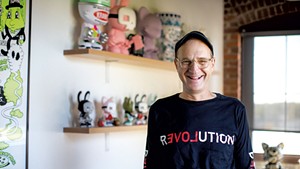The latest artsy spot in Burlington’s South End has a brick-wall background, exposed overhead pipes and spotlights illuminating swoopy curves of metal. It’s pleasing to the eyes — but it’s meant for the legs, the lungs and the lifestyle. In fact, the half dozen pieces on display are specifically designed to ride right out of the showroom, to make you feel happy and graceful and good, and to last your entire life.
Welcome to Budnitz Bicycles, undoubtedly the hippest bike shop ever to hit Burlington. It’s located within JDK Design — principal Michael Jager is an avid cyclist — on the former site of an indoor skate ramp, next to JDK’s equally hip coffee shop, Maglianero. Budnitz Bicycles is the brainchild of Paul Budnitz, artist and founder of the online store Kidrobot. The retailer of high-end, titanium-and-steel urban bikes aims to change the way the Queen City — and the world — feels about wheels.
“Bicycling can be beautiful and elegant,” says Budnitz, clad all in black and perched on a stool in his spanking-new space as he discusses changing the image of bicycles. “They’re beautiful design objects; they’re beautiful mechanically, immaculate.”
Budnitz knows a thing or two about design: Several of his Kidrobot toys are in the permanent collection of the Museum of Modern Art in New York City, and he has a deep background in photography, filmmaking and even video-game creation for Commodore 64s. But how’d a guy who has been a devotee of New York and Amsterdam, among other large cities, pick Burlington as the home for his international, artsy bicycle company?
Finding a commercial space an arm’s length from Maglianero and a few pedals from the city’s bike path didn’t hurt. But really, it was Burlington’s people, rather than beans or biking amenities, Budnitz says, that helped him park his wheels here (though he funded the company in Boulder, Colo., in 2010). “There are a lot of hardworking people who deeply care about the community; that’s for us, personally,” he says.
One of those individuals was JDK’s Jager, whom Budnitz met by chance while visiting Burlington. Another was Chapin Spencer, of biking advocacy group Local Motion; when he got wind of potential relocation interest from Budnitz Bicycles, he checked in every few days with offers of help. “It’s really his fault that I’m here, in some ways,” Budnitz says of Spencer with a laugh.
For his part, Spencer says the real draw for companies such as Budnitz is Burlington’s “growing vibrancy that has the potential to take our local outdoor industry to the next level.” As Spencer pointed out on Maglianero’s blog, walking and biking generate $82.7 million in annual economic activity and support more than 1400 jobs.
Budnitz Bicycles is currently a three-man operation, with fifth-generation painter and sculptor John Young — whom Budnitz met at a meditation retreat in Boulder, Colo. — handling much of the design, sales and media relations. Mechanic Hunt Manley was hired from Burlington’s Old Spokes Home to hand-build the bikes (the titanium frames are welded in Taiwan).
A Budnitz bike is a wonder of good design: Model No. 1, for example, has a cantilevered titanium frame that never rusts or scratches, and a clean belt instead of a greasy chain. It weighs less than 20 pounds.
Though custom bikes are hardly a new phenomenon, their growing presence in Vermont offers a new spin on alternatives to driving. Budnitz’s works of art aren’t the only options, especially for athletes with a need for speed.
Over on North Winooski Avenue, Joshua Saxe recently launched Burlington’s second, and even smaller, start-up bicycle enterprise — Flahute Bikes, an online seller of custom cycles. The Montpelier-raised rider, a University of Vermont graduate and Skirack technician, operates Flahute solo from his home. Well, sort of solo: Saxe works with a team of Taiwanese manufacturers to create carbon-fiber bikes that are primarily designed for athletes competing in road, time-trial, cyclocross and mountain biking.
“Many custom companies focus on aesthetics and comfort,” Saxe says. “While we take that into account, we also include aerodynamics, based on the rider’s goals and abilities. It’s like an awesome, speedy carbon puzzle.”
Five years ago, Saxe built a bike from recycled parts to get it to work faster. When the racing bug bit him, he found he couldn’t afford a fancy racing bike.
“So I started putting designs together for a high-end and affordable carbon bike,” says Saxe, who adds that he’s been inspired by bike companies such as Budnitz and Toronto’s Cervélo — “not their graphics but their geometrics,” he clarifies.
Saxe customizes Flahute’s graphics and colors, along with fit, for each rider. Having studied science at UVM, he knows enough about geometry to envision frames to suit each type of cyclist.
Sleek, slick and aerodynamic, a Flahute bike is built for racing — not so much for tooling around the city. “It rides like the wind,” local cyclist Paul Markowitz says of his custom Flahute rig.
Though Saxe says he’d love to have his own storefront someday, right now Flahute is a web business only; word of mouth and social media are his primary marketing tools. The unusual name helps: As Saxe explains, “flahute” was what post-World War II French journalists called their Belgian neighbors who had the grit to keep cycling amid the chaos.
Saxe’s sportsman’s view of cycling is a far cry from that of Budnitz, who says he practices the opposite of racing. “My whole thing is going really slow on a really fast bike,” Budnitz says. “I love to take my time — I’ve discovered I get all the exercise I need just integrating this into my lifestyle. You should see me on a mountain bike — I don’t last too long.”
The two shop owners do share an affinity for a city whose favorite mode of transportation has shifted, over time, from boats to trains to cars to bikes. “Burlington seems to be the hub of where things are going right now,” Budnitz says. “It’s really bringing more riders into the sport. It’s a time for big changes in cycling — things are either going to fall apart or they’re going to grow, and Burlington has taken it as a time to grow.”
Custom bikes don’t come cheap, of course. Saxe says he has worked hard to keep his operations cost-effective for riders. “My goal is to be able to sell a pretty nice bike for under $3000,” he says.
Over at Budnitz, which was modeled in part after the luxury car industry and sells internationally, bikes start at $2600. “Some people say, ‘That’s a lot of money for a bicycle,’” their designer says. “And I say, ‘It’s not a lot of money for a car. It’s going to last longer, it’s going to reduce your medical bills and you’re going to be happy with it.’”
Online testimonials from Sydney, Osaka, London and Denver, among other cities worldwide, attest to the happiness part; riders gush about the comfort, the quiet, the performance, the style and the flawlessness of Budnitz Bicycles. One calls the Budnitz the “Ferrari of bikes”; another, “the most incredible bike in the world.”
Budnitz points out that his bicycles are made to last forever. His team also sells a lightweight lock that, with a key, locks down every bolt on the two-wheeler.
What if you forget to bolt down your Budnitz? “If it’s stolen, we’ll help you get a new one,” says Budnitz, alluding to his company’s 20 percent discount on a replacement ride. “The idea is, you own one of our bikes for the rest of your life.”
CORRECTION: The original version of this article incorrectly stated the price of Budnitz's most inexpensive bicycle. The correct figure is $2600.
The print version of this article was headlined "Bespoke Spokes".











Comments
Comments are closed.
From 2014-2020, Seven Days allowed readers to comment on all stories posted on our website. While we've appreciated the suggestions and insights, right now Seven Days is prioritizing our core mission — producing high-quality, responsible local journalism — over moderating online debates between readers.
To criticize, correct or praise our reporting, please send us a letter to the editor or send us a tip. We’ll check it out and report the results.
Online comments may return when we have better tech tools for managing them. Thanks for reading.